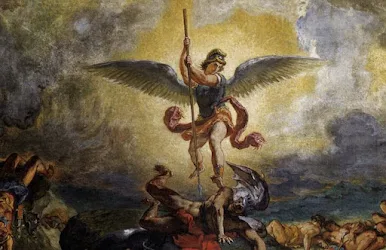
Dear Sisters and Brothers, Peace and Love of Christ Jesus
be with you all!!!
Today we meditate on
story of fall of Adam and Eve which is one
of the most defining moments in salvation history, the rupture of communion
between God and humanity. This passage narrates the tragic consequences of Adam
and Eve's disobedience, yet within its sorrow, it also unveils God's enduring
love and redemptive plan. Let us break open the text, drawing from the richness
of the Hebrew language to uncover its depth.
“Where are you?” (Ayekah?)
– The Cry of a Seeking God
When Adam and Eve eat from the forbidden tree, their first
instinct is to hide. They realize their nakedness, symbolizing their
vulnerability, guilt, and separation from God. But notice the first words from
God after their fall:
“Where are you?” (Genesis 3:9)
The Hebrew word (Ayekah?)
is not simply a question of location; it is a cry of relationship. God is
not seeking information—He already knows where Adam is. He is calling out to a
lost soul, to a heart that has drifted away. This is not the voice of an angry
judge but of a loving Father who mourns the broken communion. It is the same
cry that echoes in every human heart today. God is still asking us : “Where are
you? Where is your soul in relation to Me”?
Even today, when we sin,
our tendency is to hide, behind excuses, distractions, and even
self-righteousness. But God does not give up on us. His call invites us back
into relationship.
“The woman you gave me…”
– The Blame Game and the Fracture of Unity
Adam’s response to God's question is striking:
“The woman whom you gave
to be with me, she gave me fruit of the tree, and I ate." (Genesis 3:12)
Here, Adam does not just
blame Eve; he subtly blames God, “The woman whom YOU gave me…” In
Hebrew, the word for woman here is (Ishah), the same word that in
Genesis 2:23 Adam had joyfully used when he first saw her, “This at last is
bone of my bones, and flesh of my flesh!” Now, his language has changed.
Instead of cherishing her, he distances himself from her. Sin does not only
rupture our relationship with God; it breaks human relationships, especially
between man and woman.
How often does this
dynamic play out in relationships today? We blame each other for
our failures, seek to justify our own actions, and refuse to take
responsibility. The harmony between men and women that was intended in Eden, rooted
in mutual love and trust, becomes one of competition, mistrust, and brokenness.
“Your desire shall be
for your husband, and he shall rule over you” (Ve'el ishech teshukatech)
: The Struggle for Power
God then speaks to Eve about the consequences of sin:
“Your desire shall be
for your husband, and he shall rule over you.”(Genesis 3:16)
The Hebrew word (teshukah)
means more than just “desire.” It implies an intense longing, sometimes even an
urge to control (as seen in Genesis 4:7, where the same word is used of sin
desiring to dominate Cain). This suggests that after the fall, the relationship
between man and woman will be marked by struggle rather than harmony. Instead
of a loving partnership, there will be a battle for dominance.
Does this not reflect
what we see in many relationships today? The struggle for power, gender
conflicts, abuse, and misunderstandings; all of these trace their roots back to
this moment. Sin corrupts the natural order, distorting the beauty of
complementarity into rivalry.
But this is not God’s original plan. His intention is not
oppression but restoration—a return to mutual love, respect, and unity,
which Christ comes to reestablish.
“By
the sweat of your face… until you return to the ground”
The
Burden of a Broken World
The curse given to Adam:
“By the sweat of your
face you shall eat bread, till you return to the ground, for out of it you were
taken; for you are dust, and to dust you shall return.” (Genesis 3:19)
The Hebrew word for ground, (Adamah), is the
very root of Adam’s name. He was taken from the ground, and now because of sin,
he will struggle with it. Work, which was originally a joyful participation in
God’s creation, becomes a burden. Death enters the world. Humanity is
reminded that without God, we are dust.
How often do we see this in our world? Work that is
exhausting, life filled with suffering, the inevitability of death—these are
not how things were meant to be. And yet, God does not leave us without hope.
“The
LORD God made for Adam and his wife garments of skins and clothed them.” (Vaya’as
Yahweh Elohim le-Adam u-le-Ish’tow kot’not ‘or) – A Sign of Mercy
Despite their sin, God does something unexpected:
"The LORD God made garments of skin for Adam and his
wife and clothed them." (Genesis 3:21)
This act is deeply symbolic. The word for skin, עוֹר (or),
implies a sacrifice—perhaps the first death in history. Blood was shed to cover
their nakedness. This foreshadows Christ, the Lamb of God, whose blood would
one day cover our sin completely. Even in judgment, God’s mercy shines through.
What This Passage
Reveals About Man and Woman Today
Genesis 3:9-24 speaks to our world today:
God is still calling us back. No
matter how far we have fallen, He still asks, “Where are you?”
Sin has fractured the relationship between men and women. Instead
of unity, there is often blame, control, and struggle. But Christ restores what
was lost in Eden.
Suffering is real, but so is grace. Work,
relationships, and even death bear the scars of sin, yet God's mercy offers us
redemption.
Love requires sacrifice. The first garments came
from the death of an animal, pointing to the ultimate sacrifice of Jesus, who
covers us with His righteousness.
Ultimately, Genesis 3 does not end in despair. Though
humanity is exiled from Eden, the path to the new Eden—the New Jerusalem—is
already being prepared. The story of salvation is just beginning.
Where Are You? : Perhaps
the most urgent question for us today is the same question God asked Adam: “Where
are you?”
Where are we in our
relationship with God? With one another? With our spouse, our friends, our
community? Are we hiding, blaming, or living in the brokenness of sin? Or are
we stepping into the grace offered by Christ, the New Adam, who restores what
was lost?
May we not remain in
hiding but come out and walk once again in the light of God’s love. Amen.🙏🙏🙏








